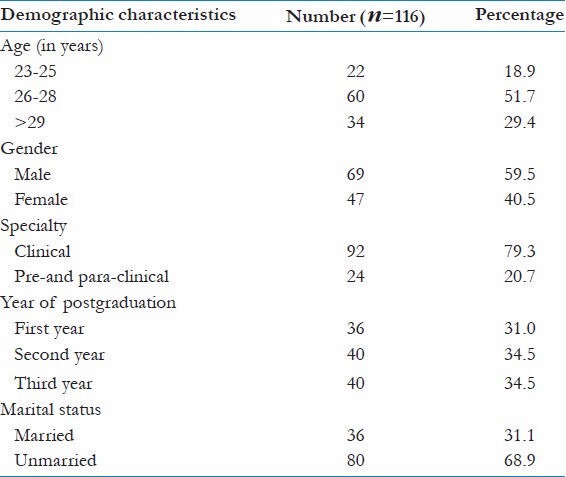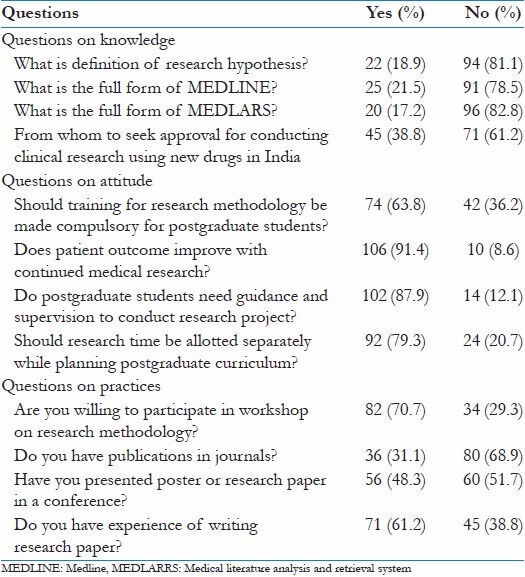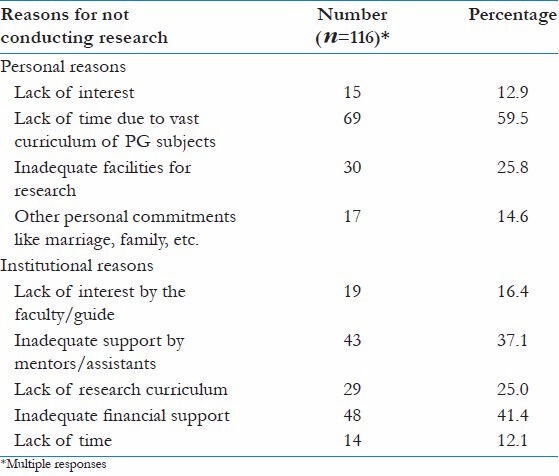Abstract
Background:
Health research training is an essential component of medical education and a vital exercise to help develop physician research skills.
Objectives:
This study was carried out to assess the knowledge, attitude, and practices towards health research amongst the postgraduate students of Pravara Institute of Medical Sciences University of central India.
Materials and Methods:
A cross-sectional study was carried out from August to October 2012. A total of 116 postgraduate students were interviewed. Knowledge, attitude, and practices related to health research were assessed using a predesigned, pretested and validated questionnaire. Results were analyzed in the form of percentage and proportions whenever appropriate.
Results:
In present study, the concept of research hypothesis was known to only 18.9% of the postgraduate students, whereas 17.2 and 21.5% students knew the full form of MEDLARS and MEDLINE respectively. Majority (91.4%) students believed that patient outcome improves with continued medical research and 70.7% are willing to participate in workshop for research methodology. Lack of time due to vast curriculum of postgraduate subjects (59.5%), lack of research curriculum (25%), and inadequate facilities (25.8%) were stated as major obstacles for pursuing research.
Conclusion:
Postgraduate students have inadequate knowledge, but have positive attitudes towards health research. Postgraduate training and research facilities at the institution need to undergo major transformation in order to encourage meaningful research by postgraduate trainees.
Keywords: Knowledge, medical research, postgraduate students, practice
Introduction
Research experience is invaluable to the physician's evidence-based practice as it imparts skills such as literature search, collecting, and analyzing data and critical appraisal of evidence.[1] Training for research skills and experience of research early in career has been associated with continued professional academic work and may help inform residents' career decisions.[2] The medical education system in India does not incorporate research methodology as a part of the curriculum. It is seen that research programs in medical colleges get the lowest priority. There are a numbers of reasons, including lack of funding and manpower resources, responsible for the poor quality in research-oriented medical education.[3] As per the Medical Council of India (MCI) requirements, postgraduate students have to carry out a dissertation project as a part of their Doctor of Medicine/Master of Surgery (MD/MS) curriculum. It is a common observation that a majority of postgraduate students conduct research projects during the 2nd or 3rd years of residency.[4] In order to encourage research orientation in postgraduate students, currently MCI has made it mandatory to not only attend one international/national conference, but also give an oral/poster presentation and send the article for publication.[5] A review of literature showed that the data regarding knowledge, attitudes, and practices toward medical research among postgraduate students pursuing postgraduate studies in India is lacking. It is felt that the existing level of knowledge and awareness among the resident doctors who have already conducted/are conducting at least one research study for their dissertation should be evaluated. Hence, the present study was carried out to assess the research-related knowledge, attitude, and practices of postgraduate students of a medical college affiliated to Pravara Institute of Medical Sciences University of central India.
Materials and Methods
A cross-sectional study was carried out between August 2012 and October 2012 at Rural Medical College of Pravara Institute of Medical Sciences (Deemed University), Loni, Maharashtra, India. A total of 139 postgraduate students studying and working at Rural Medical College were asked to participate in the study. However, only 116 (83.5%) postgraduate students consented to participate. Hence, sample size was 116 students. A predesigned and pretested questionnaire was used in this study, based on the previous literature.[6] The questionnaire was divided in three parts. The first part pertained to the demographic information of the postgraduate students like age, sex, marital status, year of postgraduation, and field of specialty. The second part had questions related to knowledge, attitude and practices about research methodology and it contained total 12 multiple choice and descriptive questions; four questions each on knowledge, attitude and practice component. The last third part of the questionnaire was related to the difficulties faced by the residents in conducting medical research. The ethics committee of the institute had approved the study. All recorded data were entered in MS Excel and analyzed in the form of percentage and proportions whenever necessary.
Results
It was observed from Table 1 that among the study population, 59.5% respondents were males and 40.5% were females; and 51.7% were in the age group 26–28 years, followed by 29.4% in the age group > 29 years. Majority (79.3%) of postgraduate students belonged to clinical departments, while only 20.7% from pre- and para-clinical departments. Among the study group, 31% students were in their 1st year of postgraduation, while 34.5% each were from 2nd and 3rd year.
Table 1.
Demographic characteristics of the study population

Proportion of subjects with correct answer for each question on knowledge, attitude and practices questionnaire was shown in Table 2. Only 18.9% students knew the definition of research hypothesis, whereas 17.2 and 21.5% students knew the full form of MEDLARS and MEDLINE respectively. Majority (91.4%) students believed that patient outcome improves with continued medical research and 79.3% needed separate time to be allotted for their thesis projects. Sixty-one percent students had previous experience of research projects, whereas 31.1% had presented papers at the institute, national, or international levels; and 70.7% are willing to participate in workshop on research methodology.
Table 2.
Assessment of knowledge, attitude and practices about medical research among study population

As shown in Table 3, the major obstacles for pursuing research among postgraduate students were lack of time due to vast curriculum of postgraduate subjects (59.5%), lack of research curriculum (25%), and inadequate facilities (25.8%) for research.
Table 3.
Reasons among postgraduate students for not conducting research

Discussion
In the present study, out of 116 postgraduate students, 61.2% students had previous experience of research projects, whereas 31.1% had presented papers at the institute, national, or international levels and 70.7% were willing to participate in workshop on research methodology. Similar results were obtained in a study done in Madison, USA; in that study, out of 143 postgraduate students, 85% felt that research experience was desirable, 48% were interested in pursuing research during residency, and only 8% were active in research.[7] However, two studies that were carried out in Canada and Pakistan reflected a contrasting attitude of postgraduate students that a majority of time in residency should be spent learning the clinical aspects of their specialty and they were unwilling to sacrifice personal time for research.[8,9] A study done by Sumi et al.,[10] also revealed that most physicians (93.2%) wanted to attend lectures or seminars on one or more topics related to clinical research. Among respondents, 68% of physicians reported current participation in clinical research and 74% reported past participation in clinical research.
In the present study, postgraduate students reported significant barriers impeding research during residency, such as lack of time, inadequate guidance from teaching staff and financial support. Similar obstacles for research among residents have been reported in a study done by Khan et al.[11] Another study done by Sumi et al.,[10] also reported that too much of paperwork was the most frequently cited obstacle in conducting clinical research, followed by lack of time. Postgraduate students were interested to learn statistics, good clinical practices, medical ethics, and protocol writing. Hence, a research curriculum should be designed considering these aspects.
Conclusion
In the present study, it was found that postgraduate students had unsatisfactory knowledge of health research. They had positive attitude towards research, but they failed to transform their knowledge and attitude in actual practices due to lack of time and lack of research curriculum. There is need to encourage postgraduate students to carry out research through provision of technical assistance and essential infrastructure during their postgraduate training program.
Acknowledgments
We express our deep sense of gratitude to the Management, Pravara Medical Trust and the Principal, Rural Medical College Loni, Maharashtra, India. We also acknowledge the help and support of medical interns: Dipti Madan, Milan Kothiya, and Abhishek Patel during data collection.
Footnotes
Source of Support: Nil.
Conflict of Interest: None declared.
References
- 1.Potti A, Mariani P, Saeed M, Smego RA., Jr Residents as researchers: Expectations, requirements and productivity. Am J Med. 2003;115:510–4. doi: 10.1016/j.amjmed.2003.08.017. [DOI] [PubMed] [Google Scholar]
- 2.Aslam F, Shakir M, Qayyum MA. Why medical students are crucial to the future of research in South Asia. PLoS Med. 2005;2:e322. doi: 10.1371/journal.pmed.0020322. [DOI] [PMC free article] [PubMed] [Google Scholar]
- 3.Requirement for research oriented medical education in India in entrance exams 2012 Education and career in India. 2011. [Last accessed on 2012 Dec 25]. Available from: http://entrance-exam.net/requirement-for-research-oriented-medical-educationin-india/
- 4.Post graduate medical education regulations 2000. [Last accessed on 2012 Dec 24]. Available from: http://www.mciindia.org/RulesandRegulations/PGMedicalEducationRegulations2000.aspx .
- 5.Medical council of India Postgraduate medical education regulations. 2000. [Last accessed on 2012 Dec 24]. Available from: http://www.mciindia.org/rules-and-regulation/Postgraduate-Medical-Education-Regulations-2000.pdf .
- 6.Pawar DB, Gawde SR, Marathe PA. Awareness about medical research among resident doctors in a tertiary care hospital: A cross-sectional survey. Perspect Clin Res. 2012;3:57–61. doi: 10.4103/2229-3485.96446. [DOI] [PMC free article] [PubMed] [Google Scholar]
- 7.Temte JL, hunter PH, Beasley JW. Factors associated with research interest and activity during family practice residency. Fam Med. 1994;26:93–7. [PubMed] [Google Scholar]
- 8.Silcox LC, Ashbury TL, Vandenkerkhof EG, Milne B. Residents' and program directors' attitudes toward research during anesthesiology training: A Canadian perspective. Anesth Analg. 2006;102:859–64. doi: 10.1213/01.ane.0000194874.28870.fd. [DOI] [PubMed] [Google Scholar]
- 9.McCrindle BW, Grimes RB. Will pediatric residents do research. A survey of residents' attitudes? Ann R Coll Physicians Surg Can. 1993;26:283–7. [Google Scholar]
- 10.Sumi E, Murayama T, Yokode M. A survey of attitudes toward clinical research among physicians at Kyoto University Hospital. BMC Med Educ. 2009;9:75. doi: 10.1186/1472-6920-9-75. [DOI] [PMC free article] [PubMed] [Google Scholar]
- 11.Khan H, Khan S, Iqbal A. Knowledge, attitudes and practices around health research: The perspective of physicians-in-training in Pakistan. BMC Med Educ. 2009;9:46. doi: 10.1186/1472-6920-9-46. [DOI] [PMC free article] [PubMed] [Google Scholar]


